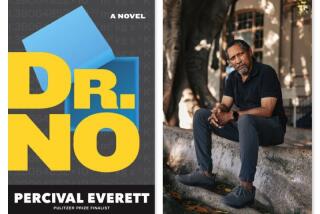Hide and seek
BRITISH writer Tom McCarthy’s debut novel, “Remainder,” left American critics enthralled when it appeared here last year. In that novel, McCarthy creates a fun-house architecture that ultimately becomes a prison for protagonist and reader alike. Narrated in the first person, “Remainder” concerns a survivor of some odd, unexplained accident. With the settlement money, he sets out to choreograph meticulously detailed “reenactments” of recalled or imagined mundane events. The question of whether the re-creation can be more authentic than the original -- whether the real fake can supersede the real thing -- gets fuzzier and fuzzier as the mentally scrambled young man stages increasingly bizarre scenarios, with eventually disastrous results. “Remainder” is a remarkable and assured piece of writing, stuffed with philosophical import yet decidedly literary, drawing as it does on the avant-garde European tradition of such writers as Raymond Queneau and Georges Perec. You might call McCarthy’s “Tintin and the Secret of Literature” a curious follow-up, but in fact it reads in places like notes to “Remainder.”
“Tintin and the Secret of Literature” explores the life and work of Herge, the Belgian writer and artist who launched the “Tintin” series of comics in Le Petit Vingtieme, the children’s supplement to a Brussels newspaper, in 1929, sending his eponymous hero off to the USSR with his faithful dog Snowy to “report” the goings-on in the new Bolshevik state. This led, a year later, to the first of the “Tintin” books (“Tintin in the Land of the Soviets”). The series became wildly popular throughout Europe -- the original drawing for the cover of “Tintin in America” (1931) fetched more than a million dollars earlier this year at auction in Paris -- and Herge churned out some two dozen “Tintin” books before his death in 1983 at age 75. The Pynchonesque derring-do of young Tintin and the rest of the recurring cast (Professor Calculus, the hard-of-hearing twins Thomson and Thompson, the velvet-voiced diva Bianca Castafiore) animated Herge’s writing with a zany brio that would be the antithesis of, say, Charles Schulz’s matter-of-fact “Peanuts.”
In France in particular, Tintin became a cottage industry, his exploits fodder for philosophers, psychoanalysts and literary critics, all of whom McCarthy leans on in asking, “Is ‘Tintin’ literature?” He notes the “huge irony . . . that the ‘Tintin’ books remain both unrivaled in their complexity and depth and so simple, even after more than half a century, that a child can read them with the same involvement as an adult.” But the question of whether they’re literature is not as interesting now, given the ascendance of pop culture. McCarthy seems to admit as much when he tweaks his query slightly: “As soon as we ask if ‘Tintin’ should be treated as literature, we raise another question: what is literature?”
Asking just what literature is propels McCarthy through a series of texts by Roland Barthes, Jacques Derrida, Paul de Man, Henri Bergson et al. He draws especially heavily on Barthes’ wonderful book “S/Z.” As it happens, “Herge” is a nom de plume, which the writer, Georges Remi, created by reversing his initials; R.G. is pronounced in French as err-jey. McCarthy slyly titles his opening chapter “R/G.”
“S/Z,” Barthes’ masterpiece of poststructuralist thought, examines the codes that, semi-self-consciously, labor like red ants under a novel’s surface. In it, Barthes provides an especially close reading of Balzac’s “Sarrasine” -- a story within a story about a sculptor who creates the perfect female form, which later turns out to be the likeness of a eunuch. What makes “Sarrasine” a model for Barthes is the unraveling of a (not so little) secret about its unsexed subject. The many iterations of that plot in Herge’s writing give McCarthy a slick entry into thinking not just about “Tintin” as literature but also about what goes on in any bit of storytelling. These are the big themes of literary analysis and criticism: patrimony and inheritance, artifice and counterfeits, encryption. Tintin’s adventures turn on crazy events, as he puzzles over various secrets, whether he’s facing a cryptic mummy in Egypt or trying to figure out what’s going on in a South American military coup. McCarthy shows, deftly and definitively, how the “Tintin” books exemplify an engagement with a profoundly literary set of ideas. His treatment of the comics isn’t “The Unbearable Whiteness of Barbie” but a piece of writing that feels lovingly indebted to Herge’s work even as it sets out on this ambitious bit of criticism.
There’s a secret written into the book’s very title. McCarthy is telling us less about, say, what literature is than what it isn’t. We come to a novel expecting it to tell us everything that it can, to be replete. McCarthy lifts the rug to show us that the more a story tells us, the more it hides. Channeling Barthes, McCarthy characterizes Tintin -- whose exploits so often involve misread missives, misunderstood map coordinates, misconstruction of another character’s language -- as standing “guardian . . . at the heart of a noise.” In all his adventures around the globe, Tintin is constantly trying to decode clues he’s been given, constantly finding himself mired in perils, from which he inevitably escapes, only to compulsively reboot the fiendish cycle again and again. All his labors turn out to be frustratingly like those of Sisyphus -- unending. Whenever he figures out a particular enigma, it only unleashes more enigmas, sending him off on yet another quest. For McCarthy, as for Barthes, this is the “secret” of literature.
“Tintin and the Secret of Literature” requires a good-faith investment of your time, not least because of the Tintin series’ relative obscurity here. Nevertheless, McCarthy has given his American readers a savvy perspective on his sophisticated views of fiction, which we will (I hope!) continue to enjoy in coming years. In his introduction to “S/Z,” poet and literary critic Richard Howard mocked a snide review of the book that said it would profit anyone who had no “instinctive enjoyment of literature.” He sneered at the notion of “instinctive enjoyment” as naive and argued that we always need a poke in the ribs when we read a novel. McCarthy’s brainy dissection of “Tintin” hits us midpoint between the head and the heart. *
More to Read
Sign up for our Book Club newsletter
Get the latest news, events and more from the Los Angeles Times Book Club, and help us get L.A. reading and talking.
You may occasionally receive promotional content from the Los Angeles Times.






